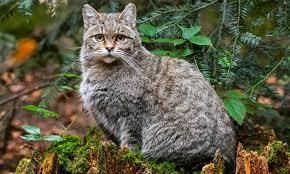Once common across the whole of the UK, they were hunted to extinction. Currently, just a handful remain in Scotland. While interbreeding between wildcats and feral domestic cats is normally rare, in the current situation feral cats outnumber wildcats 1000 to one, and as such the wildcat is essentially extinct.

The farmer who is looking to reintroduce them, currently has 6 pairs, which he is hoping to increase to 150 individuals and to start reintroducing perhaps as early as next year.
Wildcats generally feed on rodents and rabbits, so would be fantastic pest control. Given the habit of grey squirrels to spend time on the ground, it is also likely that they would reduce this population as well – another positive outcome.
The national farming union has warned that this could have “massive impacts on the many benefits that the countryside and farming delivers”. Now I am frankly baffled at this. What benefits will this impact? Apart from restoring balance to an ecosystem, they are unlikely to have a significant impact. Wildcats might give someone a nasty scratch if cornered, but are unlikely to be able to severely injure even an unaccompanied child.
Furthermore, the benefit to the countryside and farmers in particular could be significant, from fewer pests to direct benefits such as being able to run wildcat safari trips, taking tourists out to see these small predators. Unfortunately, the NFU is standing firmly against science on the reintroduction of previous animals. They must start reacting in more nuanced way, both for the benefit of the countryside they claim to protect, and the country as a whole.











